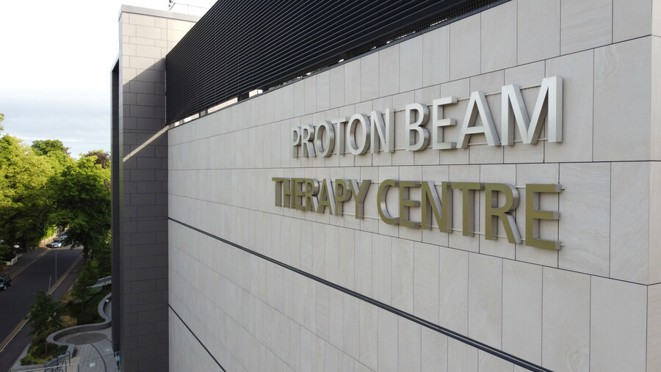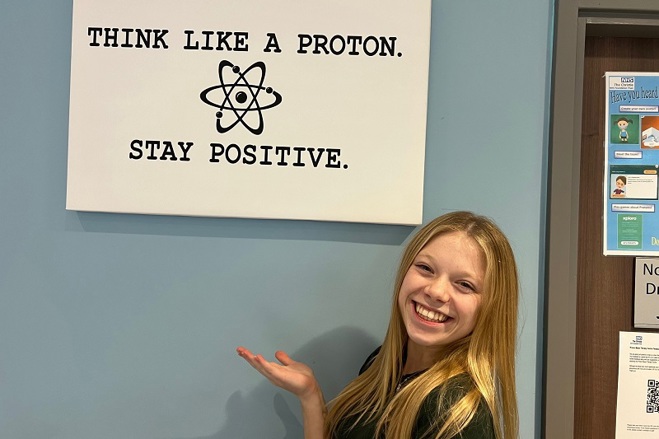Press release posted 27 February 2024
The team at The Christie are celebrating the 5th birthday of the UK’s first high-energy proton beam therapy centre. Around 1,270 people have been treated there since it opened its doors in late December 2018.
Proton beam therapy (PBT) is a form of radiotherapy. It targets tumours using high-energy protons which are shaped into a beam. Unlike standard radiotherapy, which uses X-rays, the beam doesn’t release a large amount of energy until it gets to where the tumour is. As a result, it’s potentially less damaging to the surrounding healthy tissue.

Eve Wilson is 15 and lives in Portsmouth with her family with her mum, dad and older brother. She was diagnosed with a craniopharyngioma, a brain tumour, in August 2019. She was just 10 at the time. Craniopharyngiomas represent between 5 and 10% of all paediatric brain tumours and around 30 children a year will be diagnosed with one in the UK.
Symptoms result either from the tumour blocking the flow of fluid surrounding the brain or from direct pressure and damage on the pituitary gland (a gland that makes, stores and releases hormones) or optic nerves. They include loss of vision, bad headaches and hormone deficiencies leading to slow growth.
In Eve’s case, her tumour blocked the circulation of the fluid around her brain. This build-up puts pressure on the head and is potentially life-threatening if left untreated. Her vision was also badly affected, and it became so bad that she couldn’t read the top letter on an eye chart.
Eve was operated on the day after her diagnosis. Doctors were unable to remove the tumour due to its location but were able to drain it to relieve some of the pressure. However, in spring 2020, a scan showed that a new tumour had grown in a different location. As a result, she was referred to The Christie for 28 sessions of daily PBT.
Penny Wilson, Eve’s mum, comments: “When Eve was poorly, she just couldn’t be a normal kid. She couldn’t see properly, and she was so tired that she just kept on falling asleep all the time. When we were told it was a brain tumour, my whole world changed forever. It was especially scary when they told us she had a build-up of fluid in her brain and the implications of that. We got through surgery, and then it turned out that another tumour had grown in a different place. It was an unbelievably difficult time. No one ever wants to see their child unwell.
“When we were told Eve would be having proton beam therapy in Manchester, I was worried about taking her so far from home, so the fact that she was so comfortable at The Christie is a real credit to all the staff there."
“I’ve never been looked after in a hospital as well as I was at The Christie,” comments Eve. “The staff made me feel comfortable and prepared, so I wasn’t scared before treatment. If I felt unwell, the nurses would take care of me, and I’d also never had a health play specialist to look after me before. It was nice always having friendly faces looking out for me and checking I was ok. They even let me switch my treatment times, so we could drive home for the last hour of my last day at primary school – we did a 240-mile school run.”
Eve’s treatment was successful – her tumour has stopped growing - and she’s had to have no further treatment since she finished in August 2020. In November last year, she came back to The Christie for a check-up and to see some of her team. She had done some fundraising and brought in toys for other children who are going through treatment.

Eve said: “The doctor told us everything was still fine, and we talked a bit about my future after treatment. I love dancing and was worried that I might not be able to do it as much, but he was supportive and encouraged me to keep doing the things I enjoy. It was so great to see everyone – coming back was a really positive experience for me.”
Tom Mowson, one of the radiographers who treated Eve, said: “I’m so glad to see Eve is doing so well. We try to make sure that all of our patients are as comfortable as possible while they’re with us. There’s a school at The Christie, lots of play spaces, and families have access to specialists who are there specifically to look after the children’s wellbeing while they’re there for treatment.”
“This is a big milestone for us – 5 years and around 1,270 people treated,” comments Professor Ed Smith, clinical director of proton beam therapy at The Christie. “In addition to the current routinely treated cases we also have a range of clinical trials open and the UK’s only dedicated PBT research room, helping us to develop what the future of treatment will look like as well.”
Proton beam therapy is only suitable for the routine treatment of a small number of people with certain cancer types, such as in cases where the tumour is close to critical structures like the brain or spinal cord. Standard radiotherapy using X-rays is also a targeted and highly effective treatment for most cancers requiring radiotherapy.
